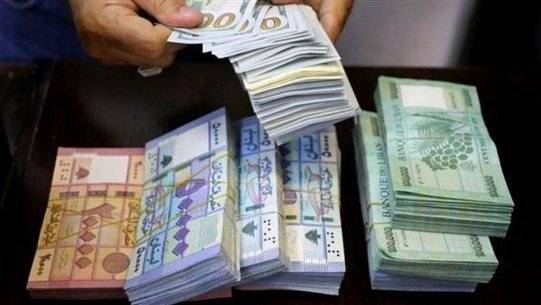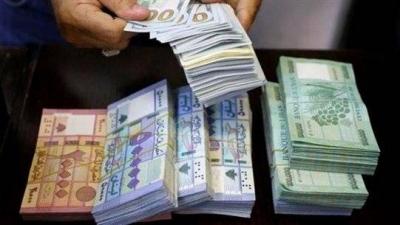Today, Lebanon's Central Bank Governor, Riad Salameh, enters the monetary exam hall alone, having chosen the timing and mechanisms at the end of last week. He aims to restore the role of the monetary authority in curbing the severe collapse of the national currency, bolstered by the immediate psychological effect resulting from the decline in the dollar's price to 27,000 Lebanese pounds after nearing 40,000 in the black market upon announcing his intention to intervene to stabilize exchange operations. According to senior officials in the financial sector, who have active political connections consulted by "Asharq Al-Awsat", the outcome of this examination will represent a pivotal moment in the governor's career, as he enters the last year of his extended term, which has been renewed four consecutive times since 1993. It is also a critical juncture for his personal professional record, as he faces long-standing calls for his dismissal from known political figures and legal inquiries both domestically and internationally. The same officials noted that the success of ending the monetary chaos would benefit citizens, the economy, and institutional management, while he alone would bear the full consequences of any failure.
This equation has indeed attracted exceptional interest beyond local scope, linked to the diversity of depositors’ and investors’ nationalities in Lebanon. Financial circles are awaiting the results of the first round, which will unfold over three consecutive days to ensure dollar liquidity in the markets, along with its outcome in reversing the trend of cash exchanges from price chaos to control by the monetary authority. The procedures will be implemented through all commercial bank branches designated with the task of receiving requests for cash liquidity conversion from Lebanese pounds to cash dollars according to the rate based on the "Sayrafa" platform, which was 24,600 pounds per dollar on the last working day prior.
According to postal notifications and voice messages circulated over the weekend, which "Asharq Al-Awsat" has reviewed samples of, bank managements have informed branch managers to prepare functionally and logistically to comply with a circular from the central bank requiring banks to keep their branches and cash registers open daily until 6 PM starting Monday for three consecutive days. This is to meet citizens' requests for purchasing dollars at the "Sayrafa" rate for those exchanging Lebanese pounds, as well as to pay public sector salaries in dollars at the same rate. Most customers also received notifications on their phones informing them of extended banking hours into the evening.
The excitement surrounding monitoring cash operations and the implications that will arise from the restoration of direct and strong intervention mechanisms by the central bank in managing cash exchanges and currency pricing has increased. There are extremely cautious signals of complete responses from decision-makers in the informal exchange markets. "Asharq Al-Awsat" observed that many street vendors deliberately set relatively high dollar prices, returning the dollar to around 28,000; however, direct communications reveal that most are refraining from purchasing dollars at the advertised price while others offer to exchange small amounts at a price nearly 1,000 pounds lower than the known rates in apps.
While the initial signs of the feasibility of the central bank's promised intervention in the dollar pricing system during the exchanges that will begin today are yet to be clarified, banking and financial circles, as well as exchange companies, have been preoccupied with examining the background of the governor's sudden move on the last workday of last week. This includes the political cover from the pillars of the executive and legislative authorities (the government and the parliament), as well as ways to secure sufficient liquidity to implement pound-to-dollar exchange operations, regardless of the quantities according to the circular. In this context, Finance Minister Youssef Khalil defended the "Sayrafa" platform, considering that the ministry "has partnered with various international financial institutions to simulate the exchange rate, all of which corresponded closely to the exchange rate set by the Sayrafa platform." Therefore, the dollar's price surge in this manner "is unnatural," raising the hypothesis that some may have created this gap, as "the scarcity of the pound and the increasing availability of dollars should lead to the opposite results, namely a decrease in the dollar’s exchange rate."
He pointed out that "the volume of transfers in the black market recently has not exceeded five million dollars per day, while trading volumes on the Sayrafa platform exceed tens of millions of dollars daily." He noted that "the global developments increasing the prices of basic commodities worldwide and the lack of any change in Lebanon's balance of payments and trade balance do not justify," according to the Finance Minister, "this difference in the exchange rate between the Sayrafa platform and the black market." He suggested that the reasons behind the dollar price increase could be "political, commercial, or to create a panic situation in the markets."
In a connected and equally important aspect, banking sources expressed concern to "Asharq Al-Awsat" about the risk of turning the initiative to regulate cash exchanges and curb the dollar's collapse into "an uncertain adventure that depletes significant amounts of the remaining hard currency reserves at the central bank," which have sharply dwindled since the financial and monetary crises exploded in the fall of 2019, amounting to over 22 billion dollars and recently falling below 10 billion dollars, which is less than the total mandatory reserves on bank deposits estimated to exceed 13 billion dollars.
The level of apprehension about further depleting reserve amounts increased after Salameh's pointed response to the Banks Association's demand to not tamper with this reserve, which represents exclusive rights for its depositors. In an official letter, he indicated that the obligation of mandatory foreign currency deposits on banks was enforced through his authority related to determining the size and conditions of bank lending, noting that the law does not require him to cover these funds in any form, whether they are reserves, deposits, or mandatory placements.
Salameh stated in his response that it is within his authority "to control the use of these funds through the application of Article 70 of the Currency and Credit Law, which mandates the Central Bank of Lebanon to maintain economic stability and the safety of the banking system in order to ensure sustainable economic and social growth."




